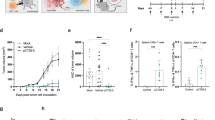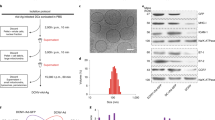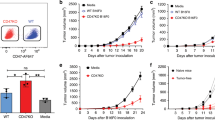Abstract
The Notch ligand delta-like ligand 4 (DLL4) is an essential component expressed by endothelial tip cells during angiogenic sprouting. We have described a conceptually novel therapeutic strategy for targeting tumor angiogenesis and endothelial tip cells based on DNA vaccination against DLL4. Immunization with DLL4-encoding plasmid DNA by in vivo electroporation severely retarded the growth of orthotopically implanted mammary carcinomas in mice by induction of a nonproductive angiogenic response. Mechanistically, vaccination brought about a break in tolerance against the self-antigen, DLL4, as evidenced by the production of inhibitory and inherently therapeutic antibodies against mouse DLL4. Importantly, no evidence for a delayed wound healing response, or for toxicity associated with pharmacological blockade of DLL4 signaling, was noted in mice immunized with the DLL4 vaccine. We have thus developed a well-tolerated DNA vaccination strategy targeting the endothelial tip cells and the antigen DLL4 with proven therapeutic efficacy in mouse models of mammary carcinoma; a disease that has been reported to dramatically induce the expression of DLL4. Conceivably, induction of immunity toward principal mediators of pathological angiogenesis could provide protection against recurrent malignant disease in the adjuvant setting.
This is a preview of subscription content, access via your institution
Access options
Subscribe to this journal
Receive 50 print issues and online access
$259.00 per year
only $5.18 per issue
Buy this article
- Purchase on Springer Link
- Instant access to full article PDF
Prices may be subject to local taxes which are calculated during checkout






Similar content being viewed by others
References
Ayyanan A, Civenni G, Ciarloni L, Morel C, Mueller N, Lefort K et al. (2006). Increased Wnt signaling triggers oncogenic conversion of human breast epithelial cells by a Notch-dependent mechanism. Proc Natl Acad Sci USA 103: 3799–3804.
Bergman PJ, McKnight J, Novosad A, Charney S, Farrelly J, Craft D et al. (2003). Long-term survival of dogs with advanced malignant melanoma after DNA vaccination with xenogeneic human tyrosinase: a phase I trial. Clin Cancer Res 9: 1284–1290.
Botusan IR, Sunkari VG, Savu O, Catrina AI, Grunler J, Lindberg S et al. (2008). Stabilization of HIF-1alpha is critical to improve wound healing in diabetic mice. Proc Natl Acad Sci USA 105: 19426–19431.
Davis BS, Chang GJ, Cropp B, Roehrig JT, Martin DA, Mitchell CJ et al. (2001). West Nile virus recombinant DNA vaccine protects mouse and horse from virus challenge and expresses in vitro a noninfectious recombinant antigen that can be used in enzyme-linked immunosorbent assays. J Virol 75: 4040–4047.
Hellstrom M, Phng LK, Hofmann JJ, Wallgard E, Coultas L, Lindblom P et al. (2007). Dll4 signalling through Notch1 regulates formation of tip cells during angiogenesis. Nature 445: 776–780.
Hoey T, Yen WC, Axelrod F, Basi J, Donigian L, Dylla S et al. (2009). DLL4 blockade inhibits tumor growth and reduces tumor-initiating cell frequency. Cell Stem Cell 5: 168–177.
Holmgren L, Ambrosino E, Birot O, Tullus C, Veitonmaki N, Levchenko T et al. (2006). A DNA vaccine targeting angiomotin inhibits angiogenesis and suppresses tumor growth. Proc Natl Acad Sci USA 103: 9208–9213.
Jones S, Evans K, McElwaine-Johnn H, Sharpe M, Oxford J, Lambkin-Williams R et al. (2009). DNA vaccination protects against an influenza challenge in a double-blind randomised placebo-controlled phase 1b clinical trial. Vaccine 27: 2506–2512.
Jubb AM, Soilleux EJ, Turley H, Steers G, Parker A, Low I et al. (2010). Expression of vascular notch ligand delta-like 4 and inflammatory markers in breast cancer. Am J Pathol 176: 2019–2028.
Jubb AM, Turley H, Moeller HC, Steers G, Han C, Li JL et al. (2009). Expression of delta-like ligand 4 (Dll4) and markers of hypoxia in colon cancer. Br J Cancer 101: 1749–1757.
Kaplan CD, Kruger JA, Zhou H, Luo Y, Xiang R, Reisfeld RA . (2006). A novel DNA vaccine encoding PDGFRbeta suppresses growth and dissemination of murine colon, lung and breast carcinoma. Vaccine 24: 6994–7002.
Li JL, Sainson RC, Shi W, Leek R, Harrington LS, Preusser M et al. (2007). Delta-like 4 Notch ligand regulates tumor angiogenesis, improves tumor vascular function, and promotes tumor growth in vivo. Cancer Res 67: 11244–11253.
Liu MA, Wahren B, Karlsson Hedestam GB . (2006). DNA vaccines: recent developments and future possibilities. Hum Gene Ther 17: 1051–1061.
Niethammer AG, Xiang R, Becker JC, Wodrich H, Pertl U, Karsten G et al. (2002). A DNA vaccine against VEGF receptor 2 prevents effective angiogenesis and inhibits tumor growth. Nat Med 8: 1369–1375.
Noguera-Troise I, Daly C, Papadopoulos NJ, Coetzee S, Boland P, Gale NW et al. (2006). Blockade of Dll4 inhibits tumour growth by promoting non-productive angiogenesis. Nature 444: 1032–1037.
Patel NS, Li JL, Generali D, Poulsom R, Cranston DW, Harris AL . (2005). Up-regulation of delta-like 4 ligand in human tumor vasculature and the role of basal expression in endothelial cell function. Cancer Res 65: 8690–8697.
Pejawar-Gaddy S, Finn OJ . (2008). Cancer vaccines: accomplishments and challenges. Crit Rev Oncol Hematol 67: 93–102.
Plum SM, Vu HA, Mercer B, Fogler WE, Fortier AH . (2004). Generation of a specific immunological response to FGF-2 does not affect wound healing or reproduction. Immunopharmacol Immunotoxicol 26: 29–41.
Pourgholami MH, Morris DL . (2008). Inhibitors of vascular endothelial growth factor in cancer. Cardiovasc Hematol Agents Med Chem 6: 343–347.
Ridgway J, Zhang G, Wu Y, Stawicki S, Liang WC, Chanthery Y et al. (2006). Inhibition of Dll4 signalling inhibits tumour growth by deregulating angiogenesis. Nature 444: 1083–1087.
Scehnet JS, Jiang W, Kumar SR, Krasnoperov V, Trindade A, Benedito R et al. (2007). Inhibition of Dll4-mediated signaling induces proliferation of immature vessels and results in poor tissue perfusion. Blood 109: 4753–4760.
Schlom J, Arlen PM, Gulley JL . (2007). Cancer vaccines: moving beyond current paradigms. Clin Cancer Res 13: 3776–3782.
Segarra M, Williams CK, Sierra Mde L, Bernardo M, McCormick PJ, Maric D et al. (2008). Dll4 activation of Notch signaling reduces tumor vascularity and inhibits tumor growth. Blood 112: 1904–1911.
Suchting S, Freitas C, le Noble F, Benedito R, Breant C, Duarte A et al. (2007). The Notch ligand delta-like 4 negatively regulates endothelial tip cell formation and vessel branching. Proc Natl Acad Sci USA 104: 3225–3230.
Ullenhag GJ, Frodin JE, Jeddi-Tehrani M, Strigard K, Eriksson E, Samanci A et al. (2004). Durable carcinoembryonic antigen (CEA)-specific humoral and cellular immune responses in colorectal carcinoma patients vaccinated with recombinant CEA and granulocyte/macrophage colony-stimulating factor. Clin Cancer Res 10: 3273–3281.
Wei WZ, Shi WP, Galy A, Lichlyter D, Hernandez S, Groner B et al. (1999). Protection against mammary tumor growth by vaccination with full-length, modified human ErbB-2 DNA. Int J Cancer 81: 748–754.
Yan M, Callahan CA, Beyer JC, Allamneni KP, Zhang G, Ridgway JB et al. (2010). Chronic DLL4 blockade induces vascular neoplasms. Nature 463: E6–E7.
Acknowledgements
We are grateful to Cyto Pulse Sciences, Inc., Glen Burnie, MD, USA for providing the technology for in vivo electroporation. This study was supported by grants to KP from the Swedish Cancer Society (Young Investigator Award and project grant), the Swedish Research Council (including a Linnaeus grant for the STARGET consortium), by a strategic grant from the Karolinska Institutet Cancer network, Åke Wiberg's foundation and Jeansson's foundation. BKH recieved support from the The Swedish National Board of Health and Welfare, The Alex and Eva Wallström foundation, The Magn. Bergvall foundation and Karolinska Institute Research foundations.
Author information
Authors and Affiliations
Corresponding author
Ethics declarations
Competing interests
The authors declare no conflict of interest.
Rights and permissions
About this article
Cite this article
Haller, B., Bråve, A., Wallgard, E. et al. Therapeutic efficacy of a DNA vaccine targeting the endothelial tip cell antigen delta-like ligand 4 in mammary carcinoma. Oncogene 29, 4276–4286 (2010). https://doi.org/10.1038/onc.2010.176
Received:
Revised:
Accepted:
Published:
Issue Date:
DOI: https://doi.org/10.1038/onc.2010.176
Keywords
This article is cited by
-
Endothelial Dll4 overexpression reduces vascular response and inhibits tumor growth and metastasization in vivo
BMC Cancer (2017)
-
Safety of targeting tumor endothelial cell antigens
Journal of Translational Medicine (2016)
-
Incomplete Dll4/Notch signaling inhibition promotes functional angiogenesis supporting the growth of skin papillomas
BMC Cancer (2015)
-
Robo4 vaccines induce antibodies that retard tumor growth
Angiogenesis (2015)
-
Dll4-Notch signaling in regulation of tumor angiogenesis
Journal of Cancer Research and Clinical Oncology (2014)



